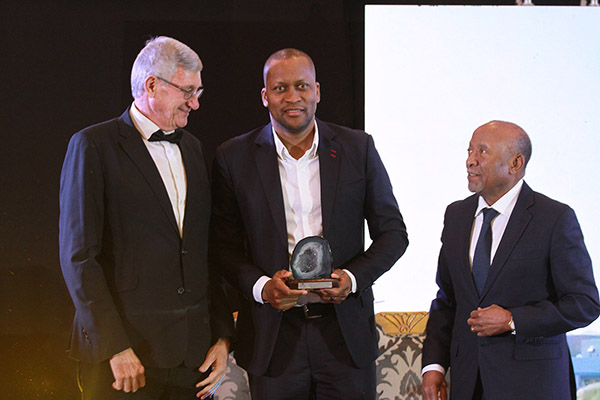Staff Reporter
The Development Bank of Namibia (DBN) hosted its prestigious 2022 Good Business Awards in Windhoek on 3 November 2022. Officiated over by the Vice President, Nangolo Mbumba, the event was attended by leading lights in Namibia’s private sector.
The event delivered wins for land servicing and education, with strong showings for tourism, manufacturing and transport and logistics. Winner of the SME category, Zealous Tutorial Centre, provides tutorial services to grades 10 and 12 learners in Rundu, enhancing secondary school educational outcomes.
Finalist Infinity Logistics operates in the transport and logistics sector, one of the sectors identified in the NDP5 as being critical to Namibia’s economic sustainability and development.
Finalist Blue-Chem Investments manufactures cleaning products in Walvis Bay. Manufacturing has been identified as an important sector for Namibia’s future economic activity.
Winner of the large enterprise category Otweya Land Developers serviced land for the large neighbourhood development at Rocky Crest Extension 4 in Windhoek. Lack of serviced land is a barrier to economic activity, socio-economic wellbeing and formation of capital.
Finalist San Kaross Lifestyle Safari developed San Kaross Lodge at Daan Viljoen, outside Windhoek. Tourism and hospitality operations, such as San Kaross, are significant employers and foreign currency earners.
Finalist and specialist educator International University of Management prepares and equips managers for roles in Namibia’s public and private sectors. In his welcoming remarks, chairperson of the DBN board Sarel van Zyl, said through its finance of sustainable enterprises, the Bank seeks to achieve a high degree of economic activity and resulting development impact as the economy recovers and in future as the economy bears fruit.
He noted that the first Good Business Awards took into consideration job creation, local sourcing, sustainable and innovative use of resources, sound administration of the enterprise and good governance.
Those judging criteria for these awards remains the same, and the finalists and winners epitomise that. In his keynote address, Mbumba’s message to the finalists and winners was one of encouragement, saying their presence is an indication of excellence. He described them as agents of development and highly valuable components in the enterprise ecosystem.
Describing the relevance of the Awards, DBN CEO Martin Inkumbi said good business consists of enterprises and initiatives that are appropriate to the Namibian economy, that satisfy demand in the market and that are well administered. Good businesses are also those that can adapt to changing circumstances and economic shocks as we have seen in the last two years. Good businesses also use their resources to accumulate capital either to grow, evolve or buffer themselves against economic shocks.
He said the concept of good business is ideal but noted it also challenges Namibia, which has traditionally been an economy dependent on regional linkages. As such, the country is influenced by neighbouring economies through the economies of scale that achieve and imports that tend to dominate Namibia.
The counters to this dependency, Inkumbi continued, is firstly to develop greater local self-sufficiency, and secondly to develop greater export capacity. Implicit to this is the need for sustainable enterprises that will endure through the years, providing consistent supply of high-quality goods and services. Good business, the DBN CEO pointed out, requires development of entrepreneurial culture, at the level of the enterprise as well as at a national level.
The Good Business Awards showcases the best enterprises financed by the bank. These businesses are sustainable, satisfy needs in the market and the economy, and are administered for long-term success. Moreover, the finalists and winners also set examples for other businesses. By examining their models and practices, other businesses can learn what it takes to succeed. Inkumbi added that DBN also learns from its finalists and winners as they become a standard against which the bank can gauge its borrowers, both in the application phase and in the support that it can offer to its existing borrowers, he concluded.



